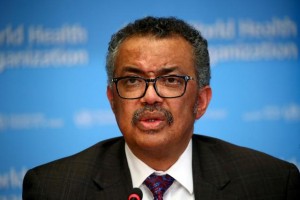The head of the World Health Organization said on Wednesday that he regretted U.S. President Donald Trump’s decision to pull funding for the agency and called for global unity to fight the new coronavirus pandemic.

Trump’s move to halt funding to the WHO over its handling of the infection prompted condemnation on Wednesday from world leaders as recorded global infections passed the 2 million mark.
“The United States of America has been a long-standing and generous friend of the WHO and we hope it will continue to be so,” WHO Director General Tedros Adhanom Ghebreyesus told a news conference. “We regret the decision of the president of the United States to order a halt in the funding to the WHO.”
He said that its performance in the crisis would be assessed later, as after every such event.
“In due course WHO’s performance in tackling this pandemic will be reviewed by WHO’s member states and the independent bodies that are in place to ensure transparency and accountability,” he said.
The WHO also helps the world’s poorest struggling with polio, measles, malaria, Ebola, HIV, tuberculosis, malnutrition, cancer and diabetes, he said.
The United States is the largest donor to the WHO, providing more than $400 million in 2019, roughly 15% of its budget.
Tedros added: “WHO is reviewing the impact on our work of any withdrawal of U.S. funding and we will work with partners to fill any financial gaps we face and to ensure our work continues uninterrupted.”
But now was the time for the world to be united against the outbreak, which he described as a “dangerous enemy”.
Dr. Mike Ryan, WHO’s top emergencies expert, said: “We are laser-focused on doing a very important job and that is suppressing this virus and saving lives.”
Trump said that the WHO had promoted Chinese “disinformation” about the virus, which had probably led to a wider outbreak. He said the WHO failed to investigate credible reports from sources in China’s Wuhan province that conflicted with Beijing’s accounts about the coronavirus’ spread and “parroted and publicly endorsed” the idea that human-to-human transmission was not happening.
Ryan said that the WHO had alerted all 194 member states on Jan 5 about the outbreak – cases of pneumonia of “unknown origin” – and that the virus sequence was shared a week later.
“When WHO issued its first guidance to countries, it was extremely clear that respiratory precautions should be taken in dealing with patients with this disease, that labs needed to be careful in terms of their precautions in taking samples, because there was a risk that the disease could spread from person-to-person in those environments,” he said.
The issue was whether the virus was spreading efficiently at community level outside those environments, he said, adding: “And that is not an easy determination to make.”
Regarding travel restrictions, he said it was the sovereign right of countries to impose them and WHO’s only role was to challenge whether they were justified on a public health basis.
Reuters


Share your thoughts